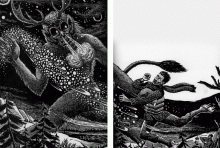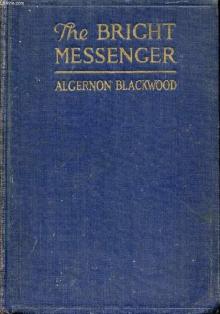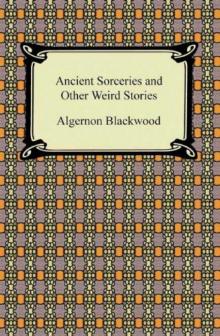- Home
- Algernon Blackwood
Three John Silence Stories
Three John Silence Stories Read online
Produced by Suzanne Shell, Dave Morgan and PG Distributed Proofreaders
Three John Silence Stories
ALGERNON BLACKWOOD
To M.L.W. The Original of John Silence
and
My Companion in Many Adventures
Contents
Case I: A Psychical Invasion
Case II: Ancient Sorceries
Case III: The Nemesis of Fire
CASE I: A PSYCHICAL INVASION
I
"And what is it makes you think I could be of use in this particularcase?" asked Dr. John Silence, looking across somewhat sceptically atthe Swedish lady in the chair facing him.
"Your sympathetic heart and your knowledge of occultism--"
"Oh, please--that dreadful word!" he interrupted, holding up a fingerwith a gesture of impatience.
"Well, then," she laughed, "your wonderful clairvoyant gift and yourtrained psychic knowledge of the processes by which a personality may bedisintegrated and destroyed--these strange studies you've beenexperimenting with all these years--"
"If it's only a case of multiple personality I must really cry off,"interrupted the doctor again hastily, a bored expression in his eyes.
"It's not that; now, please, be serious, for I want your help," shesaid; "and if I choose my words poorly you must be patient with myignorance. The case I know will interest you, and no one else could dealwith it so well. In fact, no ordinary professional man could deal withit at all, for I know of no treatment nor medicine that can restore alost sense of humour!"
"You begin to interest me with your 'case,'" he replied, and madehimself comfortable to listen.
Mrs. Sivendson drew a sigh of contentment as she watched him go to thetube and heard him tell the servant he was not to be disturbed.
"I believe you have read my thoughts already," she said; "your intuitiveknowledge of what goes on in other people's minds is positivelyuncanny."
Her friend shook his head and smiled as he drew his chair up to aconvenient position and prepared to listen attentively to what she hadto say. He closed his eyes, as he always did when he wished to absorbthe real meaning of a recital that might be inadequately expressed, forby this method he found it easier to set himself in tune with the livingthoughts that lay behind the broken words.
By his friends John Silence was regarded as an eccentric, because he wasrich by accident, and by choice--a doctor. That a man of independentmeans should devote his time to doctoring, chiefly doctoring folk whocould not pay, passed their comprehension entirely. The native nobilityof a soul whose first desire was to help those who could not helpthemselves, puzzled them. After that, it irritated them, and, greatly tohis own satisfaction, they left him to his own devices.
Dr. Silence was a free-lance, though, among doctors, having neitherconsulting-room, bookkeeper, nor professional manner. He took no fees,being at heart a genuine philanthropist, yet at the same time did noharm to his fellow-practitioners, because he only acceptedunremunerative cases, and cases that interested him for some veryspecial reason. He argued that the rich could pay, and the very poorcould avail themselves of organised charity, but that a very large classof ill-paid, self-respecting workers, often followers of the arts, couldnot afford the price of a week's comforts merely to be told to travel.And it was these he desired to help: cases often requiring special andpatient study--things no doctor can give for a guinea, and that no onewould dream of expecting him to give.
But there was another side to his personality and practice, and one withwhich we are now more directly concerned; for the cases that especiallyappealed to him were of no ordinary kind, but rather of that intangible,elusive, and difficult nature best described as psychical afflictions;and, though he would have been the last person himself to approve of thetitle, it was beyond question that he was known more or less generallyas the "Psychic Doctor."
In order to grapple with cases of this peculiar kind, he had submittedhimself to a long and severe training, at once physical, mental, andspiritual. What precisely this training had been, or where undergone, noone seemed to know,--for he never spoke of it, as, indeed, he betrayedno single other characteristic of the charlatan,--but the fact that ithad involved a total disappearance from the world for five years, andthat after he returned and began his singular practice no one everdreamed of applying to him the so easily acquired epithet of quack,spoke much for the seriousness of his strange quest and also for thegenuineness of his attainments.
For the modern psychical researcher he felt the calm tolerance of the"man who knows." There was a trace of pity in his voice--contempt henever showed--when he spoke of their methods.
"This classification of results is uninspired work at best," he saidonce to me, when I had been his confidential assistant for some years."It leads nowhere, and after a hundred years will lead nowhere. It isplaying with the wrong end of a rather dangerous toy. Far better, itwould be, to examine the causes, and then the results would so easilyslip into place and explain themselves. For the sources are accessible,and open to all who have the courage to lead the life that alone makespractical investigation safe and possible."
And towards the question of clairvoyance, too, his attitude wassignificantly sane, for he knew how extremely rare the genuine powerwas, and that what is commonly called clairvoyance is nothing more thana keen power of visualising.
"It connotes a slightly increased sensibility, nothing more," he wouldsay. "The true clairvoyant deplores his power, recognising that it addsa new horror to life, and is in the nature of an affliction. And youwill find this always to be the real test."
Thus it was that John Silence, this singularly developed doctor, wasable to select his cases with a clear knowledge of the differencebetween mere hysterical delusion and the kind of psychical afflictionthat claimed his special powers. It was never necessary for him toresort to the cheap mysteries of divination; for, as I have heard himobserve, after the solution of some peculiarly intricate problem--
"Systems of divination, from geomancy down to reading by tea-leaves, aremerely so many methods of obscuring the outer vision, in order that theinner vision may become open. Once the method is mastered, no system isnecessary at all."
And the words were significant of the methods of this remarkable man,the keynote of whose power lay, perhaps, more than anything else, in theknowledge, first, that thought can act at a distance, and, secondly,that thought is dynamic and can accomplish material results.
"Learn how to _think_," he would have expressed it, "and you havelearned to tap power at its source."
To look at--he was now past forty--he was sparely built, with speakingbrown eyes in which shone the light of knowledge and self-confidence,while at the same time they made one think of that wondrous gentlenessseen most often in the eyes of animals. A close beard concealed themouth without disguising the grim determination of lips and jaw, and theface somehow conveyed an impression of transparency, almost of light, sodelicately were the features refined away. On the fine forehead was thatindefinable touch of peace that comes from identifying the mind withwhat is permanent in the soul, and letting the impermanent slip bywithout power to wound or distress; while, from his manner,--so gentle,quiet, sympathetic,--few could have guessed the strength of purpose thatburned within like a great flame.
"I think I should describe it as a psychical case," continued theSwedish lady, obviously trying to explain herself very intelligently,"and just the kind you like. I mean a case where the cause is hiddendeep down in some spiritual distress, and--"
"But the symptoms first, please, my dear Svenska," he interrupted, witha strangely compelling seriousness of manner, "and your deductionsafterwards."
She turned round sharply on the edge o
f her chair and looked him in theface, lowering her voice to prevent her emotion betraying itself tooobviously.
"In my opinion there's only one symptom," she half whispered, as thoughtelling something disagreeable--"fear--simply fear."
"Physical fear?"
"I think not; though how can I say? I think it's a horror in thepsychical region. It's no ordinary delusion; the man is quite sane; buthe lives in mortal terror of something--"
"I don't know what you mean by his 'psychical region,'" said the doctor,with a smile; "though I suppose you wish me to understand that hisspiritual, and not his mental, processes are affected. Anyhow, try andtell me briefly and pointedly what you know about the man, his symptoms,his need for help, my peculiar help, that is, and all that seems vitalin the case. I promise to listen devotedly."
"I am trying," she continued earnestly, "but must do so in my own wordsand trust to your intelligence to disentangle as I go along. He is ayoung author, and lives in a tiny house off Putney Heath somewhere. Hewrites humorous stories--quite a genre of his own: Pender--you must haveheard the name--Felix Pender? Oh, the man had a great gift, and marriedon the strength of it; his future seemed assured. I say 'had,' for quitesuddenly his talent utterly failed him. Worse, it became transformedinto its opposite. He can no longer write a line in the old way that wasbringing him success--"
Dr. Silence opened his eyes for a second and looked at her.
"He still writes, then? The force has not gone?" he asked briefly, andthen closed his eyes again to listen.
"He works like a fury," she went on, "but produces nothing"--shehesitated a moment--"nothing that he can use or sell. His earnings havepractically ceased, and he makes a precarious living by book-reviewingand odd jobs--very odd, some of them. Yet, I am certain his talent hasnot really deserted him finally, but is merely--"
Again Mrs. Sivendson hesitated for the appropriate word.
"In abeyance," he suggested, without opening his eyes.
"Obliterated," she went on, after a moment to weigh the word, "merelyobliterated by something else--"
"By some one else?"
"I wish I knew. All I can say is that he is haunted, and temporarily hissense of humour is shrouded--gone--replaced by something dreadful thatwrites other things. Unless something competent is done, he will simplystarve to death. Yet he is afraid to go to a doctor for fear of beingpronounced insane; and, anyhow, a man can hardly ask a doctor to take aguinea to restore a vanished sense of humour, can he?"
"Has he tried any one at all--?"
"Not doctors yet. He tried some clergymen and religious people; but theyknow so little and have so little intelligent sympathy. And most of themare so busy balancing on their own little pedestals--"
John Silence stopped her tirade with a gesture.
"And how is it that you know so much about him?" he asked gently.
"I know Mrs. Pender well--I knew her before she married him--"
"And is she a cause, perhaps?"
"Not in the least. She is devoted; a woman very well educated, thoughwithout being really intelligent, and with so little sense of humourherself that she always laughs at the wrong places. But she has nothingto do with the cause of his distress; and, indeed, has chiefly guessedit from observing him, rather than from what little he has told her. Andhe, you know, is a really lovable fellow, hard-working,patient--altogether worth saving."
Dr. Silence opened his eyes and went over to ring for tea. He did notknow very much more about the case of the humorist than when he firstsat down to listen; but he realised that no amount of words from hisSwedish friend would help to reveal the real facts. A personal interviewwith the author himself could alone do that.
"All humorists are worth saving," he said with a smile, as she pouredout tea. "We can't afford to lose a single one in these strenuous days.I will go and see your friend at the first opportunity."
She thanked him elaborately, effusively, with many words, and he, withmuch difficulty, kept the conversation thenceforward strictly to theteapot.
And, as a result of this conversation, and a little more he had gatheredby means best known to himself and his secretary, he was whizzing in hismotor-car one afternoon a few days later up the Putney Hill to have hisfirst interview with Felix Pender, the humorous writer who was thevictim of some mysterious malady in his "psychical region" that hadobliterated his sense of the comic and threatened to wreck his life anddestroy his talent. And his desire to help was probably of equalstrength with his desire to know and to investigate.
The motor stopped with a deep purring sound, as though a great blackpanther lay concealed within its hood, and the doctor--the "psychicdoctor," as he was sometimes called--stepped out through the gatheringfog, and walked across the tiny garden that held a blackened fir treeand a stunted laurel shrubbery. The house was very small, and it wassome time before any one answered the bell. Then, suddenly, a lightappeared in the hall, and he saw a pretty little woman standing on thetop step begging him to come in. She was dressed in grey, and thegaslight fell on a mass of deliberately brushed light hair. Stuffed,dusty birds, and a shabby array of African spears, hung on the wallbehind her. A hat-rack, with a bronze plate full of very large cards,led his eye swiftly to a dark staircase beyond. Mrs. Pender had roundeyes like a child's, and she greeted him with an effusiveness thatbarely concealed her emotion, yet strove to appear naturally cordial.Evidently she had been looking out for his arrival, and had outrun theservant girl. She was a little breathless.
"I hope you've not been kept waiting--I think it's _most_ good of you tocome--" she began, and then stopped sharp when she saw his face in thegaslight. There was something in Dr. Silence's look that did notencourage mere talk. He was in earnest now, if ever man was.
"Good evening, Mrs. Pender," he said, with a quiet smile that wonconfidence, yet deprecated unnecessary words, "the fog delayed me alittle. I am glad to see you."
They went into a dingy sitting-room at the back of the house, neatlyfurnished but depressing. Books stood in a row upon the mantelpiece. Thefire had evidently just been lit. It smoked in great puffs into theroom.
"Mrs. Sivendson said she thought you might be able to come," venturedthe little woman again, looking up engagingly into his face andbetraying anxiety and eagerness in every gesture. "But I hardly dared tobelieve it. I think it is really too good of you. My husband's case isso peculiar that--well, you know, I am quite sure any _ordinary_ doctorwould say at once the asylum--"
"Isn't he in, then?" asked Dr. Silence gently.
"In the asylum?" she gasped. "Oh dear, no--not yet!"
"In the house, I meant," he laughed.
She gave a great sigh.
"He'll be back any minute now," she replied, obviously relieved to seehim laugh; "but the fact is, we didn't expect you so early--I mean, myhusband hardly thought you would come at all."
"I am always delighted to come--when I am really wanted, and can be ofhelp," he said quickly; "and, perhaps, it's all for the best that yourhusband is out, for now that we are alone you can tell me somethingabout his difficulties. So far, you know, I have heard very little."
Her voice trembled as she thanked him, and when he came and took a chairclose beside her she actually had difficulty in finding words with whichto begin.
"In the first place," she began timidly, and then continuing with anervous incoherent rush of words, "he will be simply delighted thatyou've really come, because he said you were the only person he wouldconsent to see at all--the only doctor, I mean. But, of course, hedoesn't know how frightened I am, or how much I have noticed. Hepretends with me that it's just a nervous breakdown, and I'm sure hedoesn't realise all the odd things I've noticed him doing. But the mainthing, I suppose--"
"Yes, the main thing, Mrs. Pender," he said, encouragingly, noticing herhesitation.
"--is that he thinks we are not alone in the house. That's the chiefthing."
"Tell me more facts--just facts."
"It began last summer when I came back from
Ireland; he had been herealone for six weeks, and I thought him looking tired and queer--raggedand scattered about the face, if you know what I mean, and his mannerworn out. He said he had been writing hard, but his inspiration hadsomehow failed him, and he was dissatisfied with his work. His sense ofhumour was leaving him, or changing into something else, he said. Therewas something in the house, he declared, that"--she emphasised thewords--"prevented his feeling funny."
"Something in the house that prevented his feeling funny," repeated thedoctor. "Ah, now we're getting to the heart of it!"
"Yes," she resumed vaguely, "that's what he kept saying."
"And what was it he _did_ that you thought strange?" he askedsympathetically. "Be brief, or he may be here before you finish."
"Very small things, but significant it seemed to me. He changed hisworkroom from the library, as we call it, to the sitting-room. He saidall his characters became wrong and terrible in the library; theyaltered, so that he felt like writing tragedies--vile, debasedtragedies, the tragedies of broken souls. But now he says the same ofthe sitting-room, and he's gone back to the library."
"Ah!"
"You see, there's so little I can tell you," she went on, withincreasing speed and countless gestures. "I mean it's only very smallthings he does and says that are queer. What frightens me is that heassumes there is some one else in the house all the

 Day and Night Stories
Day and Night Stories Four Weird Tales
Four Weird Tales The Wendigo
The Wendigo Three More John Silence Stories
Three More John Silence Stories The Garden of Survival
The Garden of Survival The Extra Day
The Extra Day The Bright Messenger
The Bright Messenger Collected Works of Algernon Blackwood
Collected Works of Algernon Blackwood The Empty House
The Empty House Three John Silence Stories
Three John Silence Stories 13 Tales of Terror
13 Tales of Terror A Prisoner in Fairyland
A Prisoner in Fairyland Ancient Sorceries And Other Weird Stories
Ancient Sorceries And Other Weird Stories The Algernon Blackwood Collection
The Algernon Blackwood Collection The First Algernon Blackwood Megapack: 36 Classic Tales of the Supernatural
The First Algernon Blackwood Megapack: 36 Classic Tales of the Supernatural John Silence, Physician Extraordinary
John Silence, Physician Extraordinary The Second Algernon Blackwood Megapack: 28 Classic Tales of the Supernatural
The Second Algernon Blackwood Megapack: 28 Classic Tales of the Supernatural The First Algernon Blackwood Megapack
The First Algernon Blackwood Megapack The Second Algernon Blackwood Megapack
The Second Algernon Blackwood Megapack